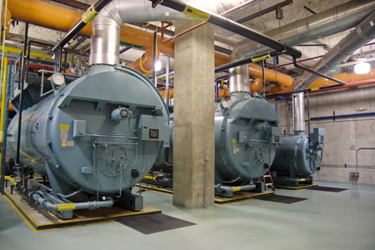Exploring The Potential Of Reclaimed Water For Industrial Boiler Feed
By Ellie Gabel

The wastewater treatment industry is quickly uncovering the usefulness of boiler feedwater for more sustainable operations. Reclaiming steam, transporting it into a condenser, and reusing the leftovers is an eco-friendly way to reduce carbon emissions and make facilities leaner. The advantages and applications are becoming more innovative and resourceful as more enterprises deploy consistent water reclamation practices.
Reduced Demand On Potable Water Sources
Freshwater resources from groundwater reserves and aquifers are struggling to stay full. Yearly use has exponentially increased since 1900. Humans use the same amount of water in an Olympic-sized swimming pool every 2.79 seconds, and projections suggest consumption will be 400 billion cubic meters soon.
Repurposing steam from boiler feedwater lowers the strain on these reserves, which take a long time to replenish. It allows communities to use them to eliminate drinking water scarcity. Lowering reliance on natural resources encourages more treatment plants to make conservation a value.
Eventually, this changes workplace culture and workflows to be more respectful and conscious of their water demands. As the company uses less and implements more sustainable practices like reclaiming boiler feedwater, it could lead to other circular economic developments.
Lower Water Costs
Water in circulation is cheaper than sourcing new potable water. Wastewater treatment facilities could lower expenses for harder-to-treat quantities. Industries with high water consumption would reduce stress on facilities by demanding less from them.
It would also lower costs by encouraging better care of existing devices. If current equipment supplies water consistently, maintenance becomes a higher priority instead of relying on a third party. A well-maintained industrial boiler could last up to 30 years, having a more eco-friendly life cycle assessment as it ages and recycles water.
Consistent Water Supply
Plants in regions with frequent drought could become more stable by relying on feedwater. The dependability reduces downtime and disruptions, saving companies money and strengthening client relationships. It will improve corporate resilience and ensure operations continue without disruption even if weather conditions are erratic.
It also challenges businesses to change their mindset. Freshwater stores like rivers and lakes are not infinite and readily accessible all the time, though some enterprises operate on this assumption. Reclaiming water from boilers helps reinforce a more realistic viewpoint about resource availability in a world plagued with depleted reserves and restrictions.
Corporations can also manage quality control more reliably with the repeated water supply since they know how it was treated and where it was reused.
Decreased Chemical Treatment Needs
Lessening chemical needs throughout the plant is ideal, as impurities could cause corrosion, pollution, and other problems. If low-quality water kept cycling from steam to the condenser, it could lead to more problems than it solves.
Depending on the treatment process and the origin of reclaimed water, it could have lower mineral and nutrient content than other sources. The qualities make these options cheaper and easier to treat if used to become potable.
Better Heat Recovery Potential
Every time the feedwater is discharged through continuous blowdown pipes, the process produces heat. Plants can incorporate peripherals to capture this energy or install a combined boiler system with automated heat recovery capabilities. Boilers naturally produce heat as a byproduct, and constant cycling of reclaimed water only gives technicians more opportunities to capitalize on this often-wasted resource.
Enhanced Support For Green Building Initiatives
Many sustainable commercial certifications require buildings to use water and energy efficiently. The criteria vary depending on the agency, but could range from engaging in heat recovery to cutting water consumption. Repurposing feedwater supports both examples. Committing to this practice could get facilities closer to receiving stamps of approval from any of these organizations:
- LEED
- WELL
- BREEAM
- SITES
Noticing the opportunity water reclamation presents could spur numerous other environmental and efficiency improvements. For example, reclaimed boiler water for radiant heating and cooling can improve internal conditions while optimizing energy efficiency. While these rating systems are optional, they could also help with mandatory regulatory compliance.
Less Wastewater Discharge
The solids and other pollutants in dirty water post-treatment contaminate nearby environments. Nonpotable water can avoid these destinations by staying within the facility’s ecosystem. Minimizing wastewater discharge sets an essential precedent for the sector. Though its goal is to clean water, getting rid of the byproducts, bacteria, chemicals, and more is an unsustainable default.
Additionally, removed nutrients like nitrogen and phosphorus can damage oceans and other waterbodies irreparably, hindering aquatic life reproduction and habitat health. Boilers are the ideal place to use the excess, preventing ecological damage.
Around 80% of global wastewater returns to nature, containing threatening contents to humans and wildlife. Lessening the discharge from the source will alleviate some of these concerns.
Same Water, Better Sustainability
Reclaiming water from boiler feed does not compromise operational quality. It only boosts it by lowering costs, reducing environmental impacts, and addressing resource scarcity worldwide. Treatment plants must encourage feedwater recycling to embrace climate resilience for their customers. It makes access more consistent and treatment more reliable as the quality improves over time.
 Ellie Gabel is a writer specializing in environmental science and innovative technologies. She can be reached at ellie@revolutionized.com.
Ellie Gabel is a writer specializing in environmental science and innovative technologies. She can be reached at ellie@revolutionized.com.
